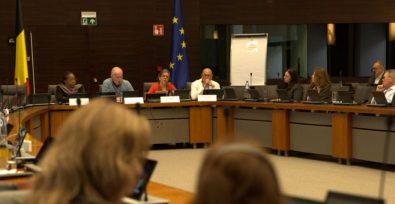The role of business and our economic system in perpetuating modern slavery received unprecedented attention from anti-trafficking experts last week. Speakers from nonprofits, business and government joined together at the 2025 Europe Freedom from Slavery Forum, organized by Free The Slaves and hosted by the Belgian Ministry of Foreign Affairs.
Increasing supply chain transparency is important. However during the event it was clear that it has failed to reduce extreme exploitation, which instead is on the rise. I witnessed, for the first time, multiple panellists highlighting the inherent nature of business, based on profit first, as a key driver of extreme exploitation.
In his keynote address, Prof. Tomoya Obokata the UN Special Rapporteur on Contemporary Forms of Slavery, said businesses need to act and prioritise people over profit. He also called for this to be backed up with more effective enforcement of legislation.
Meanwhile a representative from a cocoa industry association pled with nonprofits to coordinate behind a single due diligence framework. He highlighted the multiplicity of demands as we attempt to push business practice to align with international minimum standards, including freedom from slavery.
Europe’s measures on corporate accountability
These discussions took place at a time when Europe is taking action on corporate accountability. Samira Rafaela, a former Member of the European Parliament, delivered a powerful speech. She highlighted the success of the recently adopted EU Forced Labour Regulation, which she emphasized introduces remediation through the accompanying guidance. This means that companies can be asked to do something about forced labor.
This remediation mechanism is a significant move beyond transparency. However, several speakers, including Helene de Rengerve from Human Rights Watch, expressed concern that the European Commission is seeking to undermine this progress. Most notably, the Corporate Sustainability and Due Diligence Directive was included in the omnibus proposals announced in February. This means postponing implementation and reducing the scope of its provisions.
The omnibus raises alarm bells for a win Freedom United celebrated last year. We successfully campaigned for the inclusion of a provision to ensure that small farmers receive a living wage. Their struggle on the poverty line presents a challenge to ending exploitation in agriculture.
Is funding the real challenge?
Since that win, the landscape has changed dramatically. Whilst as recently as last year, anti-trafficking experts were encouraged by progress in Europe, at this year’s Forum, the mood was less upbeat.
The session dedicated to the funding landscape, long a concern for the sector, was more pertinent than ever. US federal funding has wiped out anti-trafficking initiatives worldwide and other governments are reducing spending on anti-trafficking measures. Whilst some European governments have stepped in, the funding gap remains large.
Panellist Mustafa Qadri, Founder and Director of Equidem, pointed out that despite appearances, funding is not the problem. He said: “We’re living in a world flooded by money.” The real challenge is the lack of political will.
A systems approach
I spoke about how modern slavery is systemic, baked into the way laws, policies and practice is implemented. My sentiments were echoed in the panel she moderated and by others throughout the Forum.
Panellists raised several important aspects of the role of the economy in perpetuating exploitation. Muriel Treibich from the Clean Clothes Campaign highlighted power imbalances in sourcing practices in the garment sector. Marco Dubbelt joined others in exposing global moral contradictions in national and international markets – the focus on raising standards in export industries whilst ignoring local markets. Andrew Wallis of Unseen explored the need for private sector to take responsibility in the face of weak regulation.
Despite the challenges, the Forum also offered positive examples of best practice in addressing modern slavery. Maud Pommier shared how Association MIST, France, demonstrated survivor leadership and meaningful engagement, and showed why it matters. Marco Dubbelt illustrated how Global March Against Child Labour has successfully addressed exploitation with a ‘whole society’ approach, lifting communities out of poverty.
Free the Slaves’ Executive Director Bukeni Waruzi concluded almost three days of discussion by highlighting three key measures — joint efforts, systemic solutions, and sustainable financing. However, the much bigger challenge for the anti-slavery effort is securing changes to our economic system. To end extreme exploitation it cannot be based on driving down prices at any cost. Recognizing the role of our economic system is a small, but significant step. After all, you can’t change what you refuse to confront.







-
Follow us on Facebook
5.6M
-
Follow us on Twitter
32K
-
Follow us on Instagram
8K
-
Subscribe to our Youtube
5.7K
Donate